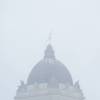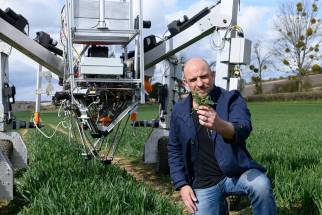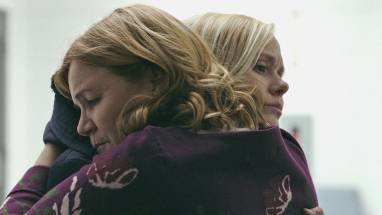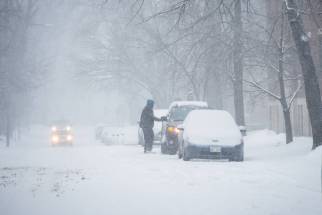Lessons are obvious in storm preparation
Read this article for free:
or
Already have an account? Log in here »
To continue reading, please subscribe:
Monthly Digital Subscription
$0 for the first 4 weeks*
- Enjoy unlimited reading on winnipegfreepress.com
- Read the E-Edition, our digital replica newspaper
- Access News Break, our award-winning app
- Play interactive puzzles
*No charge for 4 weeks then price increases to the regular rate of $19.00 plus GST every four weeks. Offer available to new and qualified returning subscribers only. Cancel any time.
Monthly Digital Subscription
$4.75/week*
- Enjoy unlimited reading on winnipegfreepress.com
- Read the E-Edition, our digital replica newspaper
- Access News Break, our award-winning app
- Play interactive puzzles
*Billed as $19 plus GST every four weeks. Cancel any time.
To continue reading, please subscribe:
Add Free Press access to your Brandon Sun subscription for only an additional
$1 for the first 4 weeks*
*Your next subscription payment will increase by $1.00 and you will be charged $16.99 plus GST for four weeks. After four weeks, your payment will increase to $23.99 plus GST every four weeks.
Read unlimited articles for free today:
or
Already have an account? Log in here »
Hey there, time traveller!
This article was published 14/04/2022 (1333 days ago), so information in it may no longer be current.
Manitobans are reliably good in a weather-related crisis. Our ability to withstand the elements is baked into our provincial identity, our history, our collective “where were you when” memories. We know we can handle what Mother Nature throws at us, because we’ve done it before.
And perhaps no one is more prepared for an April snowstorm than Manitobans who have lived through two years of a pandemic.
Indeed, the preparation for and response to the Colorado low that moved into the province on Wednesday had an unprecedented — and an unmistakably pandemic — feel. Even the directive was familiar: now is the time to stay home.
The RCMP declared highways would be closed as of midnight Tuesday (though that directive changed); some school divisions called snow days before the first flakes even fell.
The Jets postponed their Wednesday game against the Seattle Kraken. Local restaurants and businesses opted to close. Concerts were cancelled, sparing touring acts from getting hung up in a ditch. WestJet cancelled flights. Royal Manitoba Theatre Centre cancelled performances.
Offices decided to close and allow their employees to work remotely; the infrastructure to do so is, by now, well in place in a way those who worked through the 1997 or 1986 or 1966 blizzards couldn’t have imagined. The storm has, functionally, locked us down.
Perhaps we’ve learned something from the pandemic after all, the panic-buying of bread and milk notwithstanding. We don’t need to wait, and then scramble. We can make proactive decisions to close and cancel, instead of reacting when the snow is already falling and cars are already in the ditches.
We don’t have to prove anything; none of that “In my day, we walked to school uphill both ways barefoot through four feet of snow” nonsense. We can keep each other safe.
Of course, all of this deliberate, forward-thinking preparation is the result of informed decision-making.
The province recognized a dangerous wave (of weather) was coming, assembled the necessary experts to dispense information and answer questions, presented the related data to the public, and laid out how Manitobans could best keep themselves safe and make decisions about travel, appointments and getting essentials — all things that no longer happen in relation to the pandemic.
Snowfall amounts will be tracked, as will subsequent water levels. Weather and flood reports will be updated and released. Manitobans will not be kept in the dark about the storm or its after-effects.
Shouldn’t that same transparency and willingness to act be brought back to the pandemic, which is heading into new variant-driven waves? Imagine how much easier it would be to make informed decisions about our own health, and also regarding that of our communities’ most vulnerable.
Shouldn’t that same transparency and willingness to act be brought back to the pandemic, which is heading into new variant-driven waves?
The short-term emergency created by a snowstorm isn’t directly comparable the ongoing pandemic. Snowstorms are visible, for one, so perhaps they are easier to rally around. Snowstorms also tend to unite folks; there’s no shortage of stories from past blizzards about neighbours digging out neighbours, or other acts of care and community. Extreme weather events tend to bring out our best.
The pandemic, meanwhile, has also incrementally brought out some of our worst as it has dragged on. “We’re all in this together” was supplanted by “Everyone must look out for themselves”; community has too often been sidetracked for the sake of individualism.
The preparation for this week’s storm truly was encouraging. If snowstorms are part of Manitobans’ DNA, perhaps this one will help to remind us who we really are: a community whose leadership not only tells its members to “stay safe,” but actually makes it possible for them to do so.


.jpg?w=100)








.jpg?h=215)






